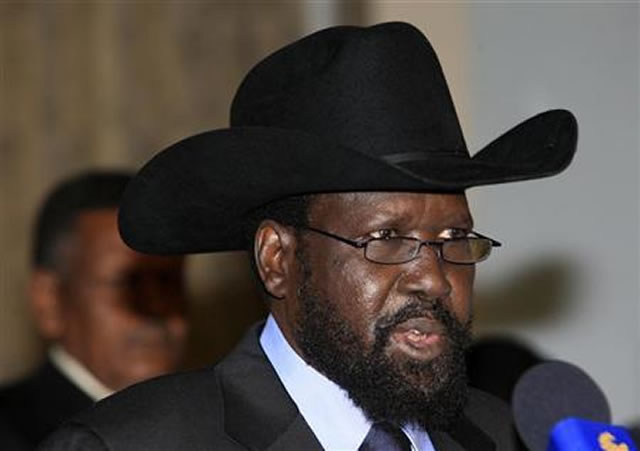South Sudan’s Kiir visits Khartoum to avert oil halt

KHARTOUM – South Sudan’s President Salva Kiir flew in to Khartoum on Tuesday for summit talks and bargaining aimed at averting a shutdown of oil pipelines vital to both stricken economies. The South Sudanese leader was welcomed on the tarmac by Sudanese President Omar al-Bashir and cabinet ministers as a military band played.
Sudan has threatened to close from Friday the lines carrying landlocked South Sudan’s oil exports — virtually its only source of foreign revenue.
Analysts expect Bashir will use the oil issue to win concessions from the South on issues including its alleged support for rebels in the north.
Kiir’s one-day visit came at Bashir’s invitation, Sudan’s Foreign Minister Ali Karti told reporters at the airport.
“Sure, it is not enough to discuss all the outstanding issues but it will solve some of them and it shows the goodwill of the two countries,” he said.
Kiir, in a statement issued after he left for Khartoum, spoke of a “new spirit of cooperation” that he expected would resolve some key issues.
While Sudanese officials and media also spoke positively, similar optimism has prevailed before only to see the two countries — whose border clashes early last year sparked fears of wider conflict — fail to implement agreements.
“As (the) oil transport deadline looms, it is expected that the extension of oil transport will be on top of the agenda to be discussed, considering that its revenues benefit both countries and represent a good approach to strike deals on other issues,” the pro-Khartoum government daily Sudan Vision daily wrote.
It urged the two leaders to “seize this opportunity”.
In June, Khartoum said it was freezing nine security and economic pacts with the South, and it threatened to shut the oil pipelines after Bashir warned the South’s government in Juba over its alleged support for insurgents.
Khartoum has twice extended its deadline to stop the oil flow.
El Shafie Mohammed El Makki, a specialist in international relations at the University of Khartoum, said the timing of Kiir’s trip was linked to Friday’s oil deadline.
“If he didn’t come, maybe they are going to shut down,” he told AFP.
Bashir would concessions in return, Makki said, including a halt to South Sudan’s alleged backing for the Sudan Revolutionary Front, an alliance of rebels from the Darfur region, South Kordofan and Blue Nile states.
“They will try to bargain,” he said of the two presidents.
The Revolutionary Front this year widened its offensive in Sudan just as the up-and-down relations between Sudan and South Sudan appeared to be improving.
In March, the two countries began implementing nine deals which they had signed in September last year but failed to implement.
The deals included a demilitarised buffer zone along the disputed and undemarcated border.
The pacts also resumed oil flows between the north and South, which pays fees to Khartoum for using its pipelines.
Sudan would potentially earn billions of dollars from those payments, while billions more would reach Juba’s treasury from the crude exports.
There was also agreement on the free flow of people and goods across the international frontier.
Senior UN officials posted in Sudan and South Sudan on Tuesday jointly urged Kiir and Bashir to fully implement another of the nine pacts, which gives freedom of residence, movement and economic activity to each country’s nationals in the other state.
“We appeal to the governments to facilitate the safe and voluntary return for those who wish to return”, they said.
About 40,000 South Sudanese in the Khartoum area are waiting to go South, the United Nations says.
A South-based analyst, Abraham Matoc, called for international pressure to make the two presidents implement their deals.
Matoc, an economics lecturer at South Sudan’s University of Rumbek, said he would not be surprised if Bashir agreed to something today “and tomorrow he does something else.”
Kiir last visited Khartoum in October 2011, a few months after his country became independent from Sudan under a peace deal which ended a 23-year civil war. – AFP.










Comments